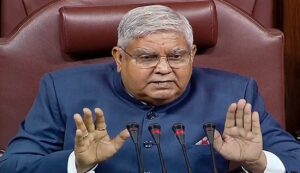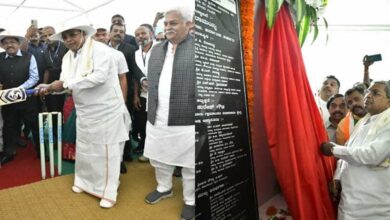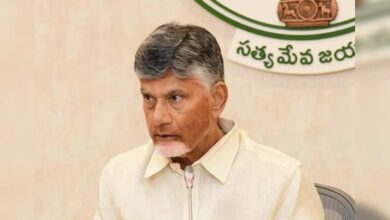Jagdeep Dhankhar expressed concern over the falling standards of etiquette and discipline
Concern about the deteriorating norms of discipline and decency in parliamentary debate was voiced by Vice-President Jagdeep Dhankhar on Tuesday.

Speaking at ‘Samvidhan Sadan’ on Constitution Day, he stated: “We must resolve this day by restating the untarnished splendor of our Constituent Assembly’s ornamented working, since decorum and discipline are at a breaking point in legislative discourse in the modern period. The use of disruption as a tactic jeopardizes democratic institutions. In order to properly serve our people, it is time to restore the purity of our democratic temples via productive discourse, meaningful discussion, and debate.
“This masterpiece is a tribute to the profound foresight and unwavering dedication of the founding fathers of our Constitution who in about three years shaped our nation’s destiny, exemplifying decorum and dedication, navigating contentious and divisive issues with a focus on consensus and understanding” , he said.
“Our Constitution cleverly establishes democracy’s three pillars–the Legislature, the Executive, and the Judiciary–each with a defined role,” Dhankhar added, emphasizing the need of the distribution of power among the state’s organs and the necessity of an organized method to settle conflicts among them.
The greatest way to foster democracy is for its constitutional institutions to work together, in unison, and within their respective spheres of influence. Domain exclusivity is essential to these state institutions’ ability to perform at their best and guide Bharat toward hitherto unheard-of levels of fairness and prosperity.
Greater convergence in serving the country would result from the development of an organized interaction mechanism among individuals in charge of these organizations.
He noted that the phrase “We the people of India” in the Constitution’s introduction affirms the people’s sovereignty. “The Constitution’s opening words, ‘We the People of India’, carry deep meaning, establishing citizens as the ultimate authority, with Parliament serving as their voice” .
“Every citizen is promised justice, liberty, equality, and fraternity in the preamble. It is our “Light House” amid difficult circumstances and our “North Star” when it comes to realizing people’s dreams,” he said.
“Our Constitution assures Fundamental Rights and ordains Fundamental duties,” he stated, highlighting devotion to fundamental duties. Dr. Ambedkar’s warning that internal strife poses a greater threat to democracy than foreign ones is reflected in these definitions of informed citizenry. It’s time for us to give our all to our core responsibilities, which include preserving our environment, promoting unity, defending national sovereignty, and putting the interests of the country first. Our country must always come first. We must be more vigilant than ever. In order to realize our vision of Viksit Bharat@2047—a country that is a shining example of growth and inclusivity—these pledges are essential.
“All citizens, especially Members of Parliament, must amplify our nation’s resonance on the world stage,” he stated, emphasizing the responsibilities of the members of parliament. May the relationship between residents and their elected representatives be preserved as this esteemed chamber reverberates with democratic knowledge.
“As defenders of democracy, we bear the sacred duty to honor our citizens’ rights aspirations and ceaselessly pursue their dreams by making optimal contributions inspired by national welfare and public interest,” Dhankhar added, recalling the dark days of emergency. Because of this, June 25 is now observed annually to serve as a reminder of the emergency—the darkest time when citizens’ basic rights were suspended, individuals were arbitrarily jailed, and civil liberties were abused.
“I seek to refer, in conclusion, Dr. B R Ambedkar’s reflections in his last address in the Constituent Assembly on November 25, 1949: “What disturbs me greatly is the fact that not only has India lost her independence once before, but she lost it by the infidelity and treachery of some of her own people,” Dhankhar said, quoting Ambedkar and stressing the importance of putting the nation first.
Will the past happen again?
“I get anxious when I think about this. The knowledge that we will have several political parties with disparate and conflicting political ideologies in addition to our long-standing adversaries in the shape of castes and creeds exacerbates this fear.
Will Indians choose their beliefs above the nation, or the other way around? I’m not sure. However, one thing is for sure: our independence will be threatened a second time and most likely lost permanently if the parties choose creed above nation. We must all firmly defend against this possibility. We have to remain committed to fighting for our freedom to the very end.





